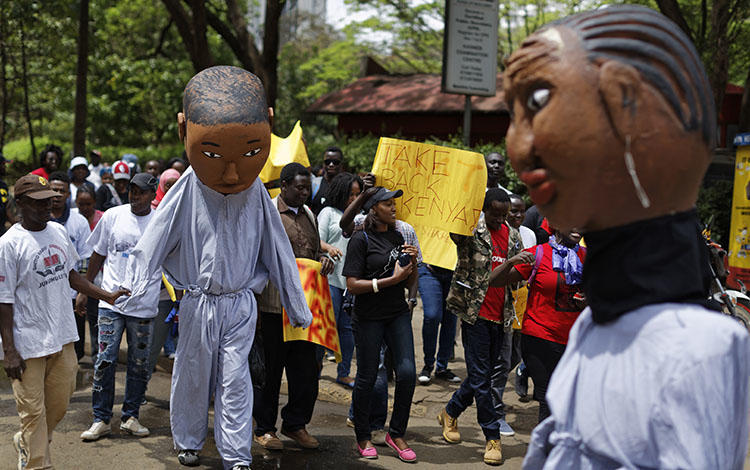Kenyan blogger Cyprian Nyakundi was arrested on May 14, 2018, on allegations of publishing “alarming” content about senior civil servants, according to court documents seen by the Committee to Protect Journalists. He was released on May 17 following the intervention of the director of public prosecutions, the blogger and one of his lawyers, Smith Otieno, told CPJ.
Nyakundi was arrested outside the Milimani Law Courts in Nairobi County, where he had gone for a hearing in a separate criminal case in which he is accused of publishing obscenities about Interior Cabinet Secretary Fred Matiang’i, Nyakundi and Dennis Owino, another blogger who is following the case, told CPJ. Following his arrest, Nyakundi was briefly held at the Muthaiga Police Station in Nairobi before he was taken to the Directorate of Criminal Investigations, where he was interrogated for about six hours, Nyakundi told CPJ. He was then taken back to the Muthaiga Police Station, where he was held until his release.
In court documents reviewed by CPJ, police alleged that Nyakundi violated Section 66 (1) of Kenya’s penal code, which stipulates up to two years in prison for publishing false statements likely to “cause fear and alarm to the public,” and Section 66A (1), which stipulates up to three years in prison and a fine of five million Kenyan shillings (US$50,000) for publishing insulting, inciting, or threatening content likely to alarm the public. In the documents, police claimed that the offenses were committed between April 30 and May 1, 2018, through Nyakundi’s blog and his Twitter account. On May 15 a court in Kiambu County remanded Nyakundi for three days to allow police time to investigate.
Although court documents did not identify specific tweets or stories, Nyakundi told CPJ that detectives interrogated him about a series of articles that he published between April 30 and May 10, citing a parliamentary submission by a self-proclaimed whistle-blower. The blogger cited the whistle-blower’s allegations that senior civil servants had received bribes to facilitate a deal in which the government is said to have improperly paid 1.5 billion Kenyan shillings (US$15 million) for land for two public schools in Nairobi. Nyakundi told CPJ that he believed the arrest and detention were meant to frustrate and intimidate him.
“I am a rabble rouser. I don’t expect people to agree with me because I have a different style of doing things,” said Nyakundi. “But I don’t think someone should be arrested for posts because that is criminalizing our work. If someone has an issue they should go the civil way.”
In a May 15 interview, Director of Public Prosecutions Noordin Haji told CPJ that he would review Nyakundi’s file to understand the nature of the publications that police believed were “alarming” and would ask for the blogger to be released if he was not satisfied. Apollo Mboya, one of Nyakundi’s lawyers, on May 16 wrote to Haji, asking him to review the “efficacy” of the evidence against the blogger, according to Nyakundi and copies of a letter seen by CPJ. Haji on May 16 directed the senior assistant director of public prosecutions in Kiambu County to withdraw and close the court file against Nyakundi, saying that a misdemeanor should not necessitate three days in detention, according to the blogger and media reports. Haji further directed that “no criminal charges” would be registered under the specific file without his “express authorization,” according to media reports. Nyakundi was released unconditionally on May 17, Otieno told CPJ.
Nyakundi is defending several court cases in connection with his work. In April, he was arrested and charged with publishing hate speech against Kenya’s Kikuyu ethnic community; publishing false content about Ken Tarus, the managing director of state-owned Kenya Power; and publishing obscene content about Nairobi Governor Mike Sonko and Kirinyaga Governor Anne Waiguru, according to media reports. On May 24, the blogger told CPJ that the cases were ongoing and that his next court appearance is scheduled for June 8.
